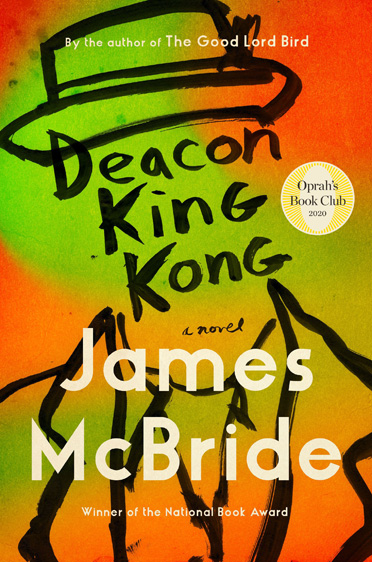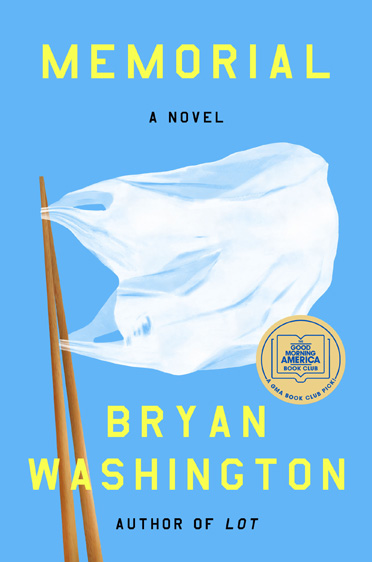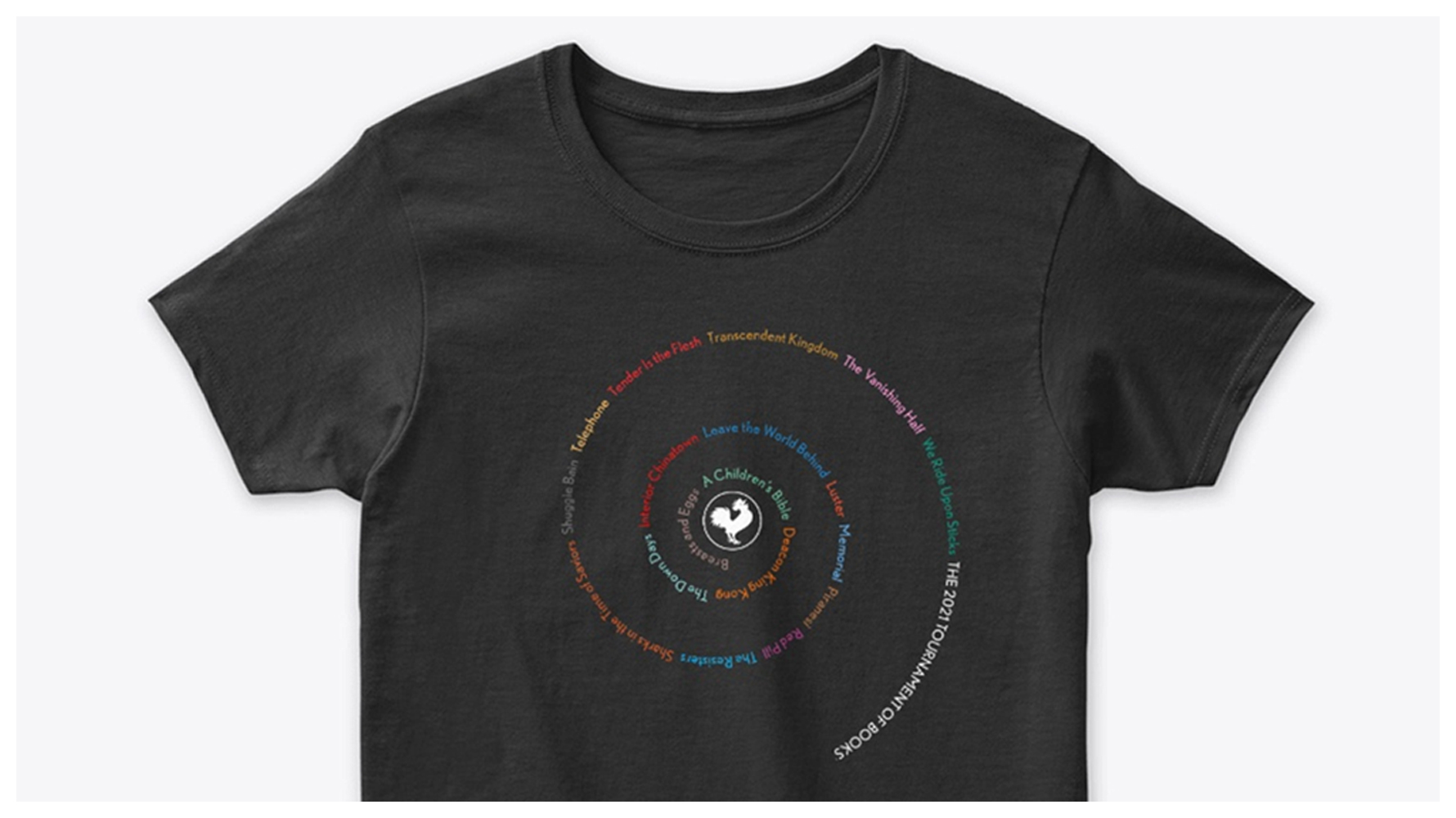-
March 19, 2021
Quarterfinals
-
James McBride
1Deacon King Kong
v.
3MemorialBryan Washington
-
Judged by
Sean Hooks
Whether reading for escape or in search of the higher nourishment provided by timeless literature, an exceptional story finely told, the content and the form, that’s the big picture. Closer scrutiny begins with character, plot, and language, weighing each book’s presentation of these three cardinal elements. Then, how well does the narrative evoke and immerse? Is it evocative of thought/feeling, and is it immersive in placing the reader into a specific world/experience? Lastly, the text’s capacity for genius, meaning its potential for posterity and its overall wow factor—to what extent is this work original, innovative, and inimitable? “Uniqueness + Level of Execution” is another way to parse it.
I came into this role as assessor saying to myself: Fair, just, balanced, and equitable, these are the qualities one values in a judge, someone capable of objective assessment who will issue a rightful ruling.
Or maybe judges are deities raining down fireballs of vengeance on those who’ve merited their wrath.
Memorial by Bryan Washington reads like a novitiate’s effort, though a feisty one. It could survive a bake sale or a round of Chopped without anyone spitting it on the ground, but if bought from an actual bakery the establishment wouldn’t get much repeat business. Deacon King Kong by James McBride understands the importance of layering one’s novelic cake with secrets and mysteries, but there’s too much Oprah-approved icing on top.
The first slice of Memorial is digestible, a fast-paced if uncompelling one-third of the book narrated by a young man named Benson. His boyfriend Mike (whose Japanese name is alluded to but never given) then narrates the novel’s midsection before Ben’s perspective returns for the brief denouement. Benson and Mike reside in Houston, but setting is inconsistently realized. The characters are three-dimensional, though most of their insights are basic. The ratio of memorable lines to faux profundity isn’t high enough. In the vastly better Mike section, set largely in Osaka, there’s a consequential vitality to the prose, a wisdom and a maturity. Unfortunately, the second Benson section is a rushed mishmash of reconciliations, redemptions, and general sentimentality. There is an overtly symbolic child’s drawing, there is a lachrymose scene at a Tex-Mex restaurant.
In terms of capturing voice, Memorial scores well, but too often the book falls into gimmickry. Abjuring quotation marks can work, but here it feels arbitrary. On the first appearance of photographs, I thought: You’re already bored with your own novel so you’re trying to embroider it with wannabe-Sebald pics. The photos do not improve from there. Both the Benson and Mike first-person POVs feature portmanteau words of “whiteboy,” “whitegirl,” “whitelady,” “whitechick,” etc. They fuse no other neologisms; it wears thin quick. An obvious way to differentiate the narratives, Mike’s doesn’t use chapters while there are numbered chapters in the Benson sections. No chapter reaches a dozen pages; one has 11 words, another six. These choices don’t read as purposeful, essential, uncompromised artistry, they read as glib, antsy, insecure.
In terms of positives, Mike’s section proceeds with grace and fluidity, and there is real elegance in the writing, right from the get-go, as exemplified by the second graf of the section:
The new complex had us parking under these busted-ass streetlights. You’d push a buzzer to open the gate but the gate just wouldn’t budge so the Filipinos smoking by the basketball court would drag it open for whatever quarters you kept in your car. Ma told Eiju that something had to change. Had to be him, or our surroundings, I’m realizing all of this later. You don’t see any of that shit when you’re a kid; you don’t have the context to flesh it all out.
There’s a full range of Note Books and related stationery products at fieldnotesbrand.com. Field Notes is proud to once again be a sponsor of the Tournament of Books.
Benson is shy, stilted, and damaged, part of why, in my interpretation, his sections are intentionally choppy, dominated by one-sentence paragraphs, but also glaring in how the puppet strings show. That said, his name is a great subversion of Robert Guillaume’s ’70/’80s sitcom butler character, and his sister Lydia, who like Mike is a few years older than Benson, offers several withering bon mots that enliven the novel. Early in the book, she incinerates someone’s unawareness of her place of employ, the Buffalo Soldier Museum downtown, and in general, the incisively scathing indictment, be it of gentrification or of performative racial ally-ism, is something Memorial pulls off with aplomb. An attention-drawing motif that works well is a series of lists—organic, poignant—Mike finds in his dying father Eiju’s apartment. Credit the first Benson section also for concluding with well-timed plot moves and surprising yet earned character reveals (later, a recalled argument regarding one of the reveals is the peak of the Mike section). Once Mike takes over, the immersion is thorough and the book becomes legitimately evocative. Longer paragraphs allow the reader to luxuriate in some well-crafted prose. The center cut of this novel contains numerous intriguing supporting characters, if too little time spent with each, but Mike’s otherwise superb pages exhibit an impressive blend of imagination and lightly worn research.
In fiction, it’s sometimes a slim separation between reassuringly light and regrettably slight. I was reminded of a friend, a deep and close reader but one who doesn’t peruse much contemporary fiction. She solicited a recommendation a few years back and I offered her David Mitchell’s Cloud Atlas (winner of the very first Rooster). When we got together to discuss it, she exclaimed, “I knew right away I would like it because it was hard! It immediately commanded my full attention, it demanded something of me, I had to concentrate on it.” Not every excellent novel is as complex as Cloud Atlas, but even with slenderer volumes one could read in a day, such as past Tournament winners like Cormac McCarthy’s The Road, Toni Morrison’s A Mercy, or Sally Rooney’s Normal People, the discerning reader wants to be gripped by a book’s sure-handed confidence. Memorial crescendos and sustains in the middle, but it disappoints at both the inception and the close.
* * *
James McBride’s Deacon King Kong foregrounds vibrant storytelling, a jazzy book that romps and frolics, spins yarns and tells tall tales, amuses and entertains. There are inconsistencies in the management of the comedic/dramatic balance, but the novel is stuffed full of compelling comestibles. Chapter 13, “The Country Girl,” for example, really hits its beats. The book’s diversity is vivacious and never forced, as the omniscient narrator tunnels into a medley of characters and what they’re thinking/feeling. And there’s an unpredictability to the flow of events that eschews deus ex machinas. Some characters are well-rendered and multidimensional while others are cartoonish and caricatured. The book’s a skosh too PG-13 for its crime genre, a landscape more perceptibly etched by Richard Price, Walter Mosley, Elmore Leonard, Dennis Lehane, James Ellroy. The plot (instantiated by an incident lifted almost directly from New Jack City and transposed to 1969 NYC) has the requisite turns and twists, and there’s a well-wrought overlay of Italian mafiosi with a richly latticed cornucopia of Black and brown folks who dwell within South Brooklyn’s Causeway Housing Projects. Female characters get shorter shrift, but this novel burbles right along, an enjoyable page-turner due not to the breezy agility of Washington’s minimalistic style, but because of McBride’s go-big-or-go-home brand of bravery and brio.
Deacon King Kong’s titular alcohol-soaked septuagenarian widower, also called Sportcoat, migrated up from South Carolina to inhabit an outer borough topography rife with like-named souls—Hot Sausage, Pudgy Fingers, Lightbulb, Beanie, Bum-Bum, Sister Gee, Soup Lopez, Bunch Moon, Sergeant Potts Mullen, Driscoll “The Governor” Sturgess, Jethro “Jet” Hardman, and Thomas “The Elephant” Elefante—that sound like something out of a Jimmy Breslin column. In an exegetic riff on page 67, after namedropping the author’s sometime collaborator Spike Lee, the book outright states that it’s trying to raise these individuals to a status greater than “local color,” to make them less “invisible,” but only a few are developed with sufficient depth. A trio of love stories delivers mixed returns. The genius quotient is low. The dynamic verve of the storytelling provides the draw.
I was hoping to be blown away (or at least find something intellectually stimulating that I could recommend to others) but was disappointed by both texts. Memorial clearly wins on character and Deacon King Kong obtains an easy victory in plot. Both texts lack aesthetically inventive or distinctive language. Memorial is subtle but attenuated, Deacon King Kong baroque but broad. Memorial triumphs on mood and tone but Deacon King Kong’s omniscient POV is the higher degree of difficulty maneuver and he also interweaves his highly variant elements more smoothly. That said, Deacon King Kong is a smidge more schematic and a little less literary than Memorial. The socio-political soapbox gets dragged out in both books, but with fuller history behind it and spliced in more seamlessly in Deacon King Kong.
Neither title is trite, hackneyed, or artless, and I’m sure I’ll get some pushback from members of the Commentariat who loved one or both of these, but for me anyway the good is the enemy of the great. I think it’s unlikely that these two books will be much read, loved, or discussed in a hundred years. If this were the 1921 Tournament of Books, I may have deliberated over out-of-print books now long forgotten or been tasked with weighing the merits of debut novels by F. Scott Fitzgerald (This Side of Paradise) and Agatha Christie (The Mysterious Affair at Styles) or essaying the continuing careers of D.H. Lawrence (Women in Love) and Colette (Chéri). Those four books are still read, but none is their author’s best (or most popular, or most influential) work. 1920 produced one indispensable masterpiece, Edith Wharton’s The Age of Innocence, and hopefully whichever title takes this year’s Rooster incarnates even a fraction of that book’s invigorating brilliance and enduring virtuosity.
Like my selection to advance, the grande dame of American letters (Wharton was the first woman to hoist not a Rooster but a Pulitzer) had a grandiloquent nickname (”Miss Pussy Jones”), and in her timeless classic a character heaps his plate with straw-colored griddle cakes and drowns them in golden syrup. Nothing quite as tasty on the two-item menu I was asked to adjudicate, but in the contest of these two novels—the Millennial Montrose Meringue versus the Boomer Bed-Stuy Blackout Brownie—my decision is…
Match Commentary
By Shoshana Smith & Rosecrans Baldwin
Rosecrans Baldwin: To discuss today’s judgment, we’re joined by another independent bookseller, Shoshana Smith from Northern California’s Flashlight Books. Shoshanna, will you tell the readers a little bit about yourself and Flashlight?
Shoshana Smith: Thank you so much for including me in this year’s Tournament commentators. I’m one of the owners of Flashlight Books, a bookstore in Walnut Creek, Calif. We’re a small, independent bookstore with a particular focus on children’s and young adult books, but we carry all sorts.
Rosecrans: How would you describe your own reading tastes?
Shoshana: I love reading young adult books, both for work and for myself. I also read a lot of romance, fantasy, and enjoy memoirs, travelogues, and other narrative nonfiction.
Rosecrans: So, what do you think of today’s judgment? The judge seemed fairly disappointed that neither of these novels were particularly great books as he would have it.
Shoshana: So, I’ll admit, I felt a little divided reading the judge’s essay. I really appreciated how he dissected the two books and how critical his reading was, and the problems he described are issues I often find in contemporary “literary” fiction. On the flip side, I think the notion of the Great Works of Literature is often why a lot of fiction, particularly any with a genre focus, gets sidelined. The judge’s criticism of, say, works by famous authors that weren’t their “best,” read a little “literary snobby” to me. What about those of us who didn’t prefer The Age of Innocence?
Rosecrans: I’m more a fan of The Reef myself. Are you familiar with the two books in contention today?
Shoshana: I’m familiar with them in the sense that we have carried and sold both in my bookstore and I’ve glanced over them, as I try to glance over most of the books we get in. But they were picked by our adult book buyer, so I’m not super familiar with them.
Rosecrans: Still, what kind of metric might you have used to decide?
Shoshana: As I mentioned, I liked how the judge really broke each book down to its strengths and weaknesses. I’d like to think I’d do something similar. And sometimes I do! More often, I judge books by how much I remember about them three months (or weeks) later. This comes up a lot as a book buyer—I’ll read a book and have to make the buy choice (or sell it to a customer) quite a bit later.
Rosecrans: That’s really interesting. What typically stands out for you?
Shoshana: If I can remember anything, that’s a good sign. If I remember how it made me feel and the major plot beats, I probably loved—or hated—it. I’m being glib, but it really is true. If a novel was so impactful, or moving, or funny that I can handsell it six months later, it was probably pretty great.
Rosecrans: I like this line from the judgment: “In fiction, it’s sometimes a slim separation between reassuringly light and regrettably slight.” If only because some of the novels that have made the biggest impression on me as a reader are flyweights. (My Ántonia by Willa Cather, hello.) But there’s a data point from previous Tournaments that very big novels often do pretty well in the ToB, if only because doorstops will earn points off our cultural bias for significance-from-heft.
Shoshana: I honestly feel this notion is a construct of the literary fiction club. I don’t believe light means slight by any means, whether you’re talking about light content or light on page count, and I don’t think it’s a fair yardstick to measure books by, so to speak. It sounds idealistic to say, but I think authors—of literary fiction, or any other kind of fiction—should write the stories they want to tell. I like to use Dear Martin by Nic Stone as an example of a book that’s on the short side (around 200 pages) but packs an incredible punch, and it’s exactly as long as it needs to be; it’s streamlined, with no padding. Long books can be great too, but not if they’re long only to satisfy some capital-L literature gospel.
Rosecrans: Alas, poor Casaubon! And his infinite struggle.
Shoshana: I have similar feelings about tragedy, and certain character tropes that often come up in literature. This discussion has accidentally revealed one of my soapboxes, and I hope you’ll forgive me for it. And I’m not saying literary fiction is without merit. Britt-Marie Was Here by Fredrik Backman left me moved for days. (Years? It’s still with me.) But can you honestly say you gain more from a book when it’s “weighty,” either in terms of reading about the same characters trying and failing for 450 pages, or in terms of dozens of failing marriages, distant spouses, abusive childhoods, or lonely navel-gazing?
Rosecrans: I don’t know. It’s a rare mega novel that persuades me its length is justified, yes. But my favorite book really is Middlemarch, for all my cheesy Casaubon jokes, and I find its length a feature, a place to get lost, a long duration of time to feel and think. To go back to handselling for a moment, is it always about the personal connection for you?
Shoshana: My answer to this lies alongside what I mentioned before, about books staying with me. That’s always a big factor in what I buy (for the store) and sell (to the customer). As a small store, we have the luxury of really curating our stock to our personal definitions of excellence. Yes, we stock some books because they’re big deals, whether according to critics, or because of who the author is. But one of my absolute favorite things in the world is having a conversation with a customer where they talk about books they’ve liked, books they haven’t, and having this “aha!” moment, because I know something they’ll love, either because I read it or a co-worker did and told me about it. To be fair, at that point it’s not really about the “greatness” of a book, in a judging sense, and more about its greatness for a particular person. Which is, truthfully, all I really care about as a bookseller.
Rosecrans: Well, hopefully we’ll all be roaming around bookstores again soon. Because I gotta assume it’s been a weird time lately for you.
Shoshana: Bookselling during the pandemic has been a totally different beast, like most jobs. We’ve always sold online, but now it’s a significant percentage of our sales—and for a while it was the majority, and we’ve had to build systems for that. Shopping is by appointment in our store, and pushing out to connect with the community is that much harder. It’s hard. But the biggest loss is, unfortunately, one of the biggest reasons we started a bookstore: the physical community space. What’s the greatest pleasure you take from a bookstore?
Rosecrans: Browsing.
Shoshana: Browsing for as long as you want—
Rosecrans: Geez louise do I miss browsing for as long as I want—
Shoshana: And chatting to others about the books on the shelves. Coming to storytime, or in-person events, or book club (which we’ve had to move to Zoom), or flipping through the newest picture books to see which one your kid or niece or godkid will love best. We’re not sure when that will be back. We hope by the fall. Until then, we’re trying to meet the needs of our community, and those outside who shop with us, and hoping to share enough book love so we’ll still be here when that time comes.
Rosecrans: Well, keep fighting the good fight, Shoshana! And thank you for joining us today.
Kevin Guilfoile: Hi everybody! I’m just popping in with an update on the Zombie standings. Sadly, Memorial does not have the juice to unseat either Piranesi or The Vanishing Half from their unholy perches. Therefore, those two books would still be our Zombies if that round were held today.
We’ll see you next week, and in the comments section before then!
New 2021 Tournament of Books merch is now available at the TMN Store. As a reminder, Sustaining Members receive 50 percent off everything in our store. To find out why we’re asking for your support and how you can become a Sustaining Member, please visit our Membership page. Thank you.
Welcome to the Commentariat
Population: You
To keep our comments section as inclusive as possible for the book-loving public, please follow the guidelines below. We reserve the right to delete inappropriate or abusive comments, such as ad hominem attacks. We ban users who repeatedly post inappropriate comments.
- Criticize ideas, not people. Divisiveness can be a result of debates over things we truly care about; err on the side of being generous. Let’s talk and debate and gnash our book-chewing teeth with love and respect for the Rooster community, judges, authors, commentators, and commenters alike.
- If you’re uninterested in a line of discussion from an individual user, you can privately block them within Disqus to hide their comments (though they’ll still see your posts).
- While it’s not required, you can use the Disqus <spoiler> tag to hide book details that may spoil the reading experience for others, e.g., “<spoiler>Dumbledore dies.<spoiler>”
- We all feel passionately about fiction, but “you’re an idiot if you loved/hated this book that I hated/loved” isn't an argument—it’s just rude. Take a breath.




